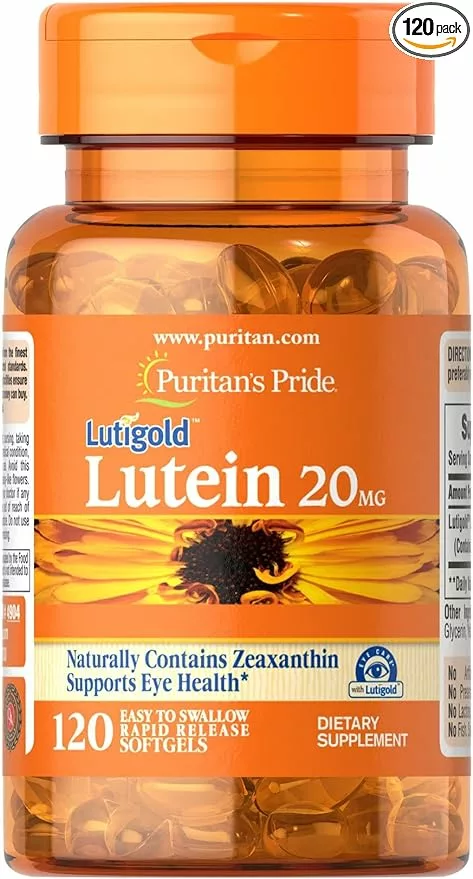Zeaxanthin, a naturally occurring pigment found in the eye, plays a critical role in maintaining the health of the retina and macula. These are crucial for sharp, detailed central vision. It is one of two primary carotenoids located within the eye’s retina.
Extensive research has demonstrated its importance in protecting the eyes from the damaging effects of light and oxidation. This antioxidant function helps to mitigate the impact of exposure to blue light and ultraviolet radiation, which can lead to chronic eye conditions.
In addition to protecting the eye’s delicate tissues, zeaxanthin has been associated with a reduction in the risk of certain eye conditions that can impair vision, such as age-related macular degeneration (AMD).
Nutrition and supplementation play a key role in maintaining adequate levels of zeaxanthin in the eye. Foods rich in this antioxidant, such as leafy greens, corn, and egg yolks, can contribute to eye health. Zeaxanthin supplements are also available for those looking to bolster their intake.
Key Takeaways
- Zeaxanthin functions as a protective pigment in the retina and macula, supporting sharp vision.
- It shields the eyes from harmful light and may reduce the risk of certain eye conditions.
- Adequate dietary intake of zeaxanthin is essential for maintaining its beneficial effects on eye health.
Understanding Zeaxanthin

Zeaxanthin is a powerful carotenoid found in various foods that plays a crucial role in maintaining eye health. This section delves into the specifics of its role and where it can be sourced.
Role in Eye Health
Zeaxanthin, along with lutein, is one of the main antioxidants found in the human eye. They are concentrated in the macula, an area of the retina responsible for high-resolution vision. These carotenoids are known to absorb harmful blue light, thereby protecting the eyes from light-induced oxidative damage which can lead to conditions like macular degeneration. Studies from sources like Preventive Medicine Daily have highlighted the importance of both zeaxanthin and lutein in maintaining optimal visual function.
Sources of Zeaxanthin
Zeaxanthin is present in various green vegetables, such as kale and spinach, as well as in corn, egg yolks, and certain fruits. The body cannot synthesize zeaxanthin, so incorporating these foods into a diet is essential for acquiring adequate amounts. For those unable to meet their needs through diet alone, supplements containing zeaxanthin are also available. The Cleveland Clinic provides additional information on the importance of dietary sources and supplements in ensuring sufficient intake of this carotenoid for eye health.
Zeaxanthin and Eye Structures
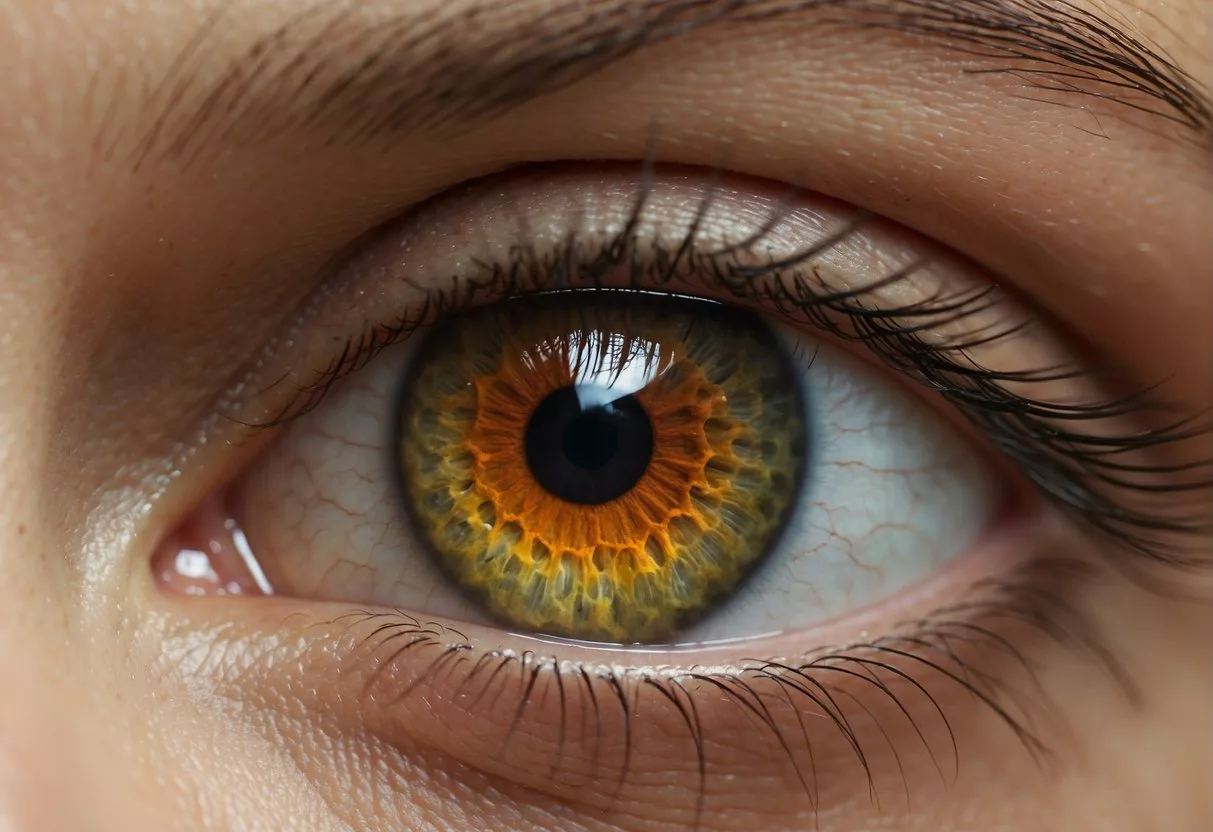
Zeaxanthin is a crucial carotenoid that plays a significant role in maintaining the health and function of eye structures, specifically the macula and retina.
Protection of the Macula and Retina
Zeaxanthin, along with lutein and meso-zeaxanthin, form the macular pigment. This pigment is positioned in the macula, a small area of the retina responsible for central vision. They protect the retina by filtering harmful blue light and serve as antioxidants, reducing the risk of oxidative stress, which can lead to age-related macular degeneration. High levels of zeaxanthin can be found in dark green vegetables, orange and yellow fruits, and egg yolks.
Macular Pigment and Its Importance
The density of the macular pigment is closely linked to visual acuity and the overall health of the eyes. Zeaxanthin and lutein are the only carotenoids located in the lens and retina of the eyes, which suggests a specific role in protecting against age-related macular degeneration. By absorbing blue light and neutralizing free radicals, these macular pigments help maintain the structural integrity of the macula. Their presence is inversely associated with the lens density, indicating a protective marker for eye health, as described in a study about lutein and zeaxanthin.
Zeaxanthin’s Effects on Eye Conditions
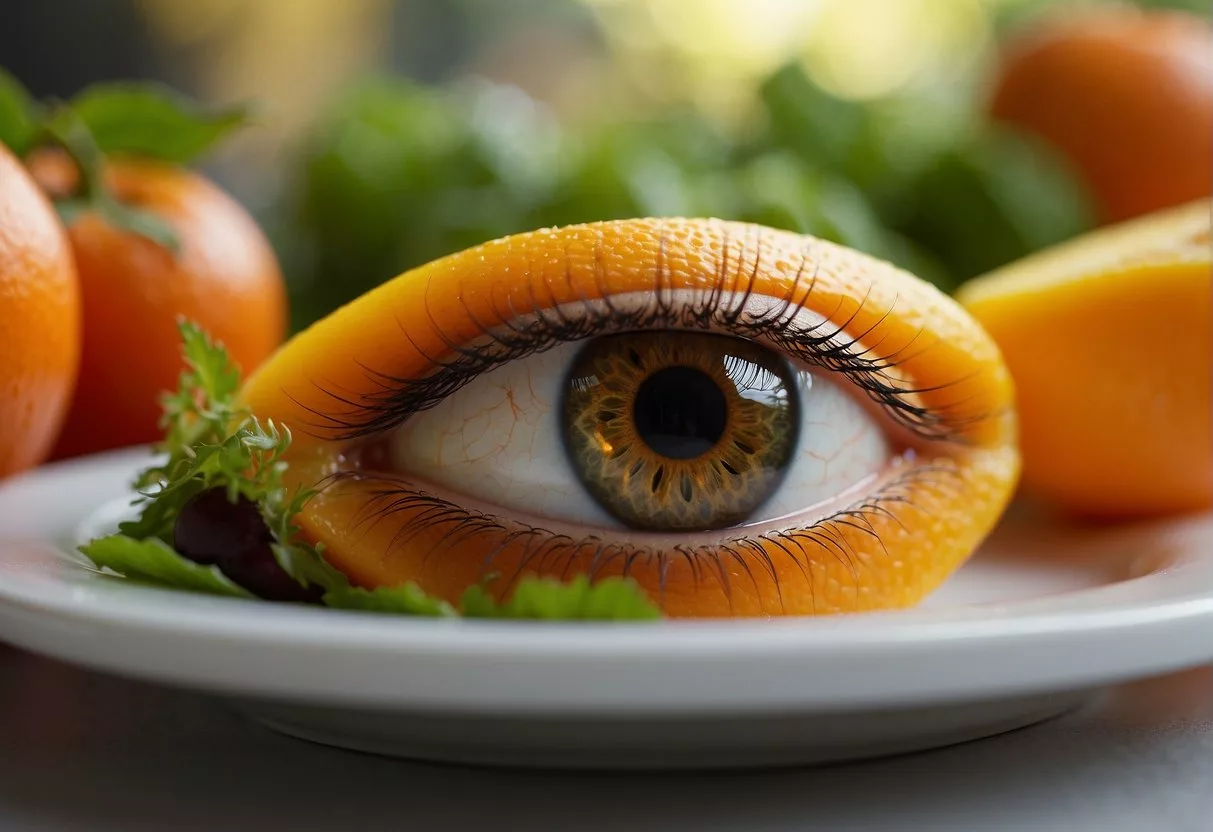
Zeaxanthin is a potent carotenoid that plays a significant role in maintaining eye health, with evidence pointing to its ability to protect against certain eye conditions. Research suggests that regular intake of zeaxanthin can benefit age-related macular degeneration (AMD) and cataracts, and may influence other eye diseases.
Beneficial Impact on Macular Degeneration
Zeaxanthin, concentrated in the macula of the eye, filters out harmful blue light and oxidative stress, conditions associated with the progression of AMD. It’s well-documented that adequate levels of this nutrient can help maintain macular health and possibly slow the progression of age-related macular degeneration.
Cataract Formation Prevention
One of the risk factors for cataract formation is oxidative damage to the lens of the eye. Studies suggest that zeaxanthin, with its antioxidant properties, can help to reduce this risk by protecting the lens from oxidative stress, potentially delaying or preventing the development of cataracts.
Other Eye Diseases and Concerns
While the research is still evolving, there’s promising evidence that zeaxanthin may contribute to eye health beyond AMD and cataract prevention. It might play a role in protecting against other eye conditions such as diabetic retinopathy, glaucoma, and retinal detachment, which are linked to oxidative damage and inflammation. However, more research is needed to fully establish these effects.
Zeaxanthin’s Interaction with Light and Oxidation
Zeaxanthin plays a crucial role in protecting the eyes from harmful light waves and the oxidative stress they can cause. This carotenoid helps to maintain eye health by filtering light and mitigating the potential damage from oxidation.

Filtering Blue Light and UV Radiation
Zeaxanthin acts as a natural filter for blue light and UV radiation, which are both components of sunlight that can be harmful to the eyes. By absorbing these high-energy wavelengths, zeaxanthin helps to protect the retina from blue light damage that can lead to eye diseases such as age-related macular degeneration.
Reducing Oxidative Stress and Free Radicals
The antioxidant properties of zeaxanthin contribute to its ability to reduce oxidative stress within the eye. It neutralizes free radicals, which are unstable molecules that can damage cells and tissues, including those in the eyes. Thus, zeaxanthin helps to preserve the integrity of eye tissues and may prevent or slow the progression of certain disorders associated with oxidative damage.
Nutrition and Supplementation
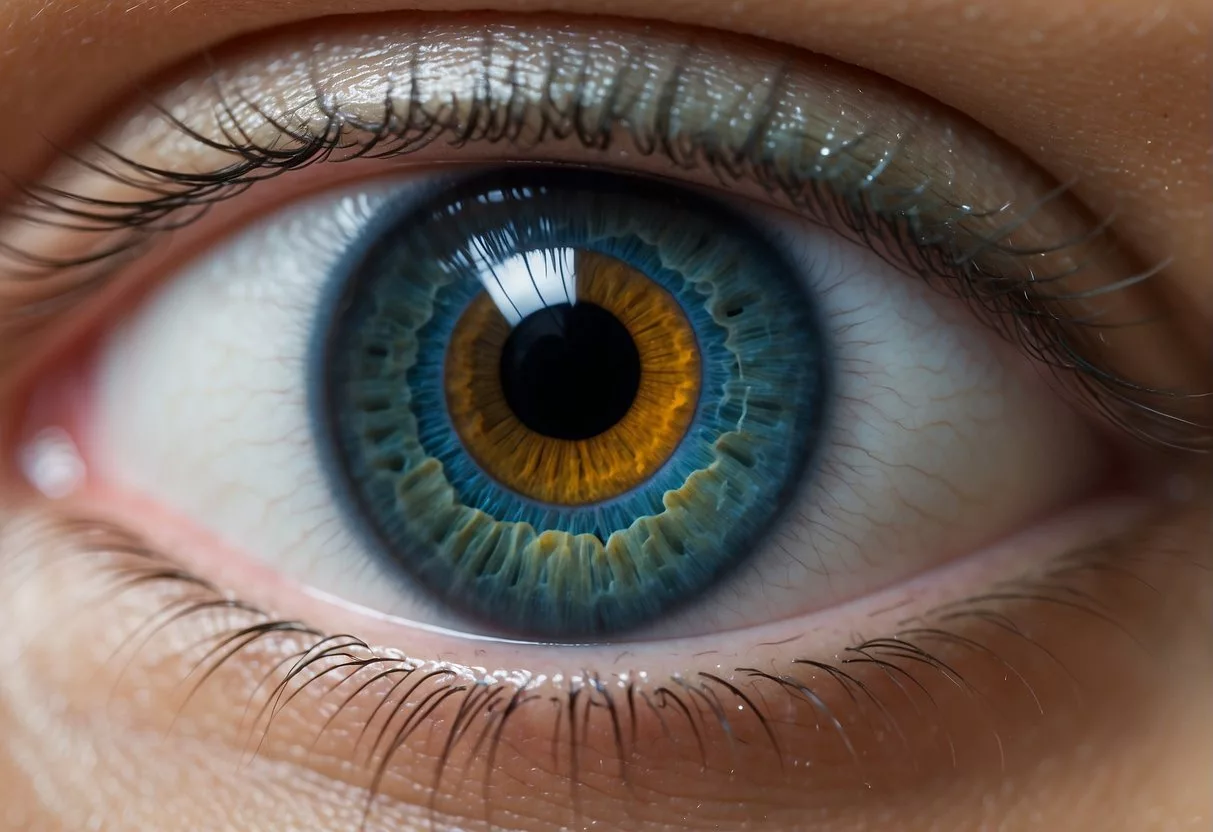
Zeaxanthin, along with lutein, is a powerful antioxidant that plays a critical role in maintaining eye health. The body doesn’t naturally produce these carotenoids, so they must be obtained through diet or supplements. This section covers the best food sources and essential considerations for supplementation.
Best Dietary Sources
The human eye contains two carotenoids: zeaxanthin and lutein. These antioxidants are found abundantly in various fruits and vegetables. Major dietary sources of zeaxanthin include:
- Leafy Greens: Kale and spinach offer some of the highest levels of zeaxanthin and lutein, providing protective benefits against harmful light.
- Yellow Vegetables: Corn is another vegetable with a significant amount of zeaxanthin.
- Egg Yolks: They are not only rich in protein but also contain these essential carotenoids.
- Fruits: Orange and yellow fruits like oranges and peaches contribute to daily zeaxanthin intake.
Supplementation Considerations
For individuals unable to meet their zeaxanthin needs through diet alone, supplements can be an effective alternative. When considering a supplement, keep in mind:
- Quality: Look for brands that source zeaxanthin from natural sources, such as marigold flowers.
- Dosage: The recommended dietary intake for eye health is about 2 mg/day of zeaxanthin and 10 mg/day for lutein.
- Risks: While there is no established upper limit for zeaxanthin, excessive amounts may lead to harmless yellowing of the skin known as carotenemia.
Health Benefits Beyond Vision

While zeaxanthin is well-known for supporting eye health, its benefits extend to other areas of the body as well. This powerful antioxidant plays a role in skin protection and may contribute to the body’s defense against various diseases.
Skin Health and Aging
Zeaxanthin, alongside other antioxidants, has been shown to benefit skin health.
It helps protect the skin against the damaging effects of ultraviolet rays, potentially slowing down skin aging.
For instance, the antioxidant properties of zeaxanthin may aid in preventing premature aging of the skin and could even have implications for reducing the risk of skin cancer.
Potential Protective Role Against Diseases
Beyond the skin, zeaxanthin may also offer protective roles against certain diseases.
There is evidence suggesting that antioxidants, like zeaxanthin, could play a role in reducing the risk of chronic conditions such as liver disease, atherosclerosis, and cardiovascular disease.
These benefits arise from the compound’s ability to combat oxidative stress, which is a contributor to the development and progression of these diseases.
Scientific Research and Evidence

Extensive scientific research has established zeaxanthin as a significant nutrient for maintaining eye health.
It is particularly helpful in preventing and managing macular degeneration and other retinal conditions.
Clinical Studies
Clinical studies have consistently demonstrated that zeaxanthin, a non-provitamin A carotenoid, plays a crucial role in protecting the eyes.
It helps to filter harmful high-energy blue wavelengths of light and acts as an antioxidant.
Studies, such as one published by the National Center for Biotechnology Information (NCBI), have indicated that increased dietary intake of zeaxanthin can improve visual performance and reduce the risk of age-related macular degeneration (AMD), which is a leading cause of blindness in the elderly.
Additional research has linked the nutrient to a potential protective effect against the development of cataracts and diabetic retinopathy, conditions that can also lead to significant visual impairment.
- AREDS and AREDS2 Studies: The Age-Related Eye Disease Studies (AREDS and AREDS2) are among the most referenced. They concluded that formulations containing antioxidants, including zeaxanthin, can slow the progression of AMD in individuals with intermediate to advanced stages of the disease.
- Effects on Cataracts: Research has suggested that the antioxidant properties of zeaxanthin may also help reduce the formation of cataracts, although further evidence is needed to substantiate these findings in broader populations.
Future Research Directions
The existing evidence provides strong support for the importance of zeaxanthin in eye health. However, future research aims to further understand this carotenoid’s full potential.
Continued investigations hope to clarify the specific mechanisms by which zeaxanthin and other carotenoids like lutein contribute to the prevention of macular degeneration and other eye-related diseases.
Moreover, research intends to establish standardized dosing recommendations and explore the potential benefits of zeaxanthin supplementation in individuals with various stages of retinal health.
- Dosing and Supplementation: Determining the optimal levels of zeaxanthin intake for various age groups and health conditions is a key research goal, which can lead to personalized dietary recommendations.
- Technology and Techniques: The use of modern research techniques, as hinted in recent studies, may unveil new evidence supporting the role of zeaxanthin in eye health and beyond.
Considerations for Usage
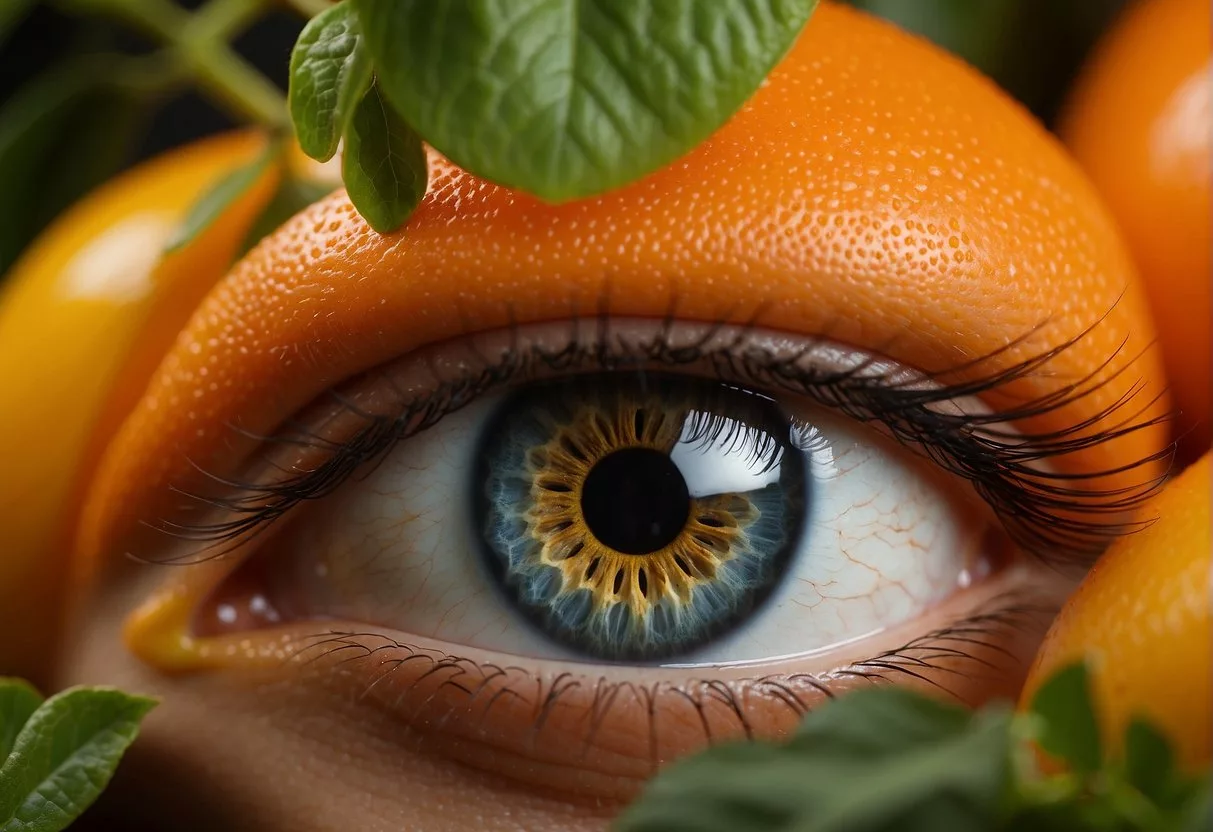
When considering zeaxanthin as a supplement, it is crucial to understand appropriate dosage levels and any potential risks. Additionally, knowing the regulatory status can help consumers make informed decisions.
Safe Dosage and Potential Risks
The recommended dietary intake for zeaxanthin is not established, but studies suggest that a daily intake of 2 mg may be beneficial for eye health.
Zeaxanthin supplements are generally considered safe when used at this level. However, as with any supplement, there is a potential for side effects, particularly if taken in excessive amounts.
The body efficiently regulates dietary zeaxanthin, which minimizes the risk of toxicity, but excess intake can still present risks such as yellowing of the skin, known as carotenemia.
- Recommended Daily Intake: Not firmly established.
- Common Use: ~2 mg per day for eye health benefits.
- Potential Risks:Excessive DosagePotential Side Effects>20 mg per daySkin yellowing (carotenemia)
Zeaxanthin is usually well-tolerated when taken within the suggested dosage guidelines.
Regulatory Status
Zeaxanthin is not currently regulated by the FDA as a drug; it is classified as a dietary supplement.
This means that its manufacturing and labeling are subject to less rigorous oversight than prescription medications.
It’s essential for consumers to choose reputable brands that adhere to high-quality standards to ensure product safety and efficacy.
- FDA Classification: Dietary supplement.
- Quality Assurance: Look for third-party testing and GMP certification.
Frequently Asked Questions
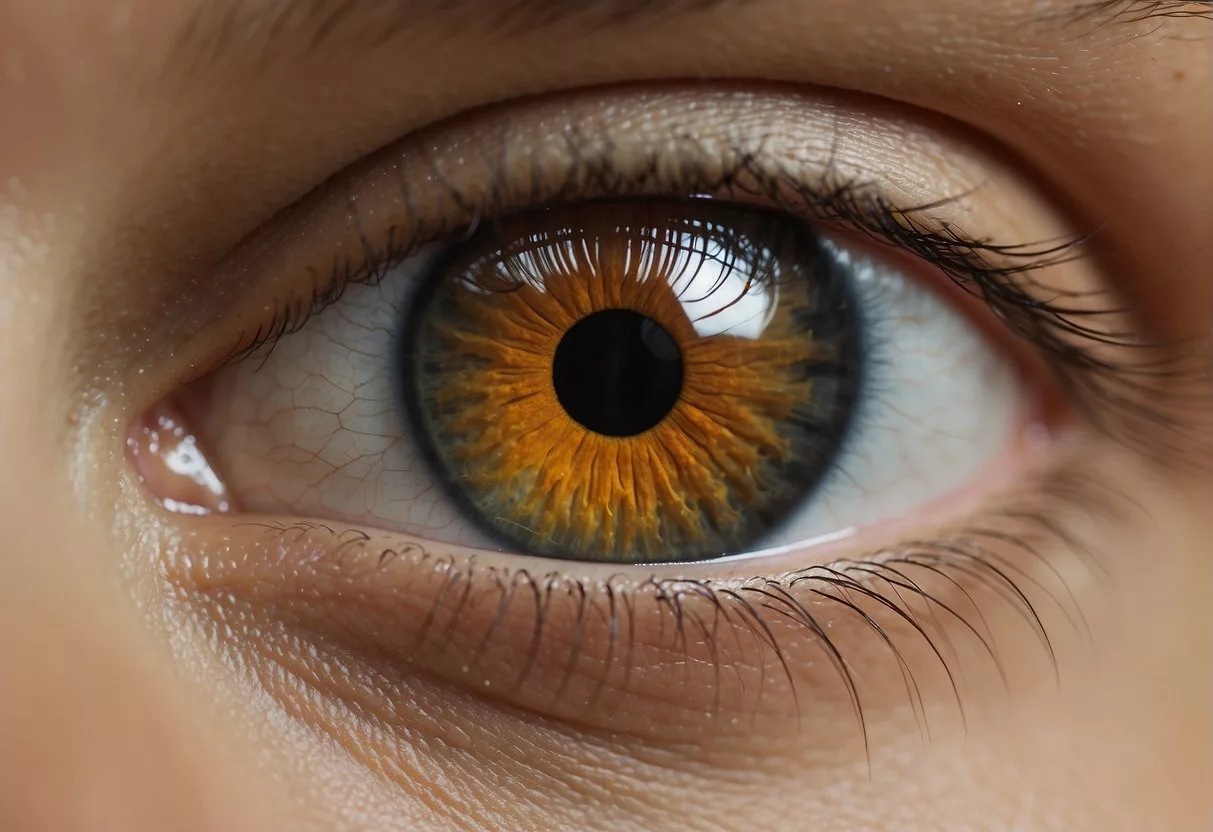
This section addresses common inquiries regarding the role of zeaxanthin in maintaining eye health, including its benefits, recommended intake, possible side effects, and its comparison with lutein, another important eye health nutrient.
What are the benefits of zeaxanthin for the eyes?
Zeaxanthin acts as a powerful antioxidant in the eyes, particularly in the macula, to help protect them from harmful effects of oxidation and high-energy light. Verywell Health explains its significance in eye health maintenance.
Can a daily intake of zeaxanthin improve overall vision quality?
Regular consumption of zeaxanthin may contribute to improved visual acuity by protecting the eyes from harmful light and oxidative stress.
However, its effect on enhancing vision quality is best understood as part of a balanced diet rich in various nutrients.
What is the recommended dosage of zeaxanthin for optimal eye health?
While a specific recommended daily amount for zeaxanthin is not established, WebMD suggests a level of 2 mg per day, alongside 10 mg of lutein, for supporting eye health.
Are there any significant side effects associated with zeaxanthin supplements?
Zeaxanthin is generally considered safe; however, there is no established safe upper limit for consumption. High doses may cause yellowing of the skin, as highlighted by WebMD.
How does zeaxanthin compare with lutein regarding eye health?
Zeaxanthin and lutein are both carotenoids found in the retina that function similarly to protect the eyes from light-induced damage.
However, zeaxanthin is specifically concentrated in the macula, complementing lutein’s protective effects.
What are the best dietary sources of zeaxanthin?
The best sources of zeaxanthin include dark green vegetables, yellow and orange fruits, and egg yolks. The body does not produce zeaxanthin naturally, so you must consume it through diet or supplements.
